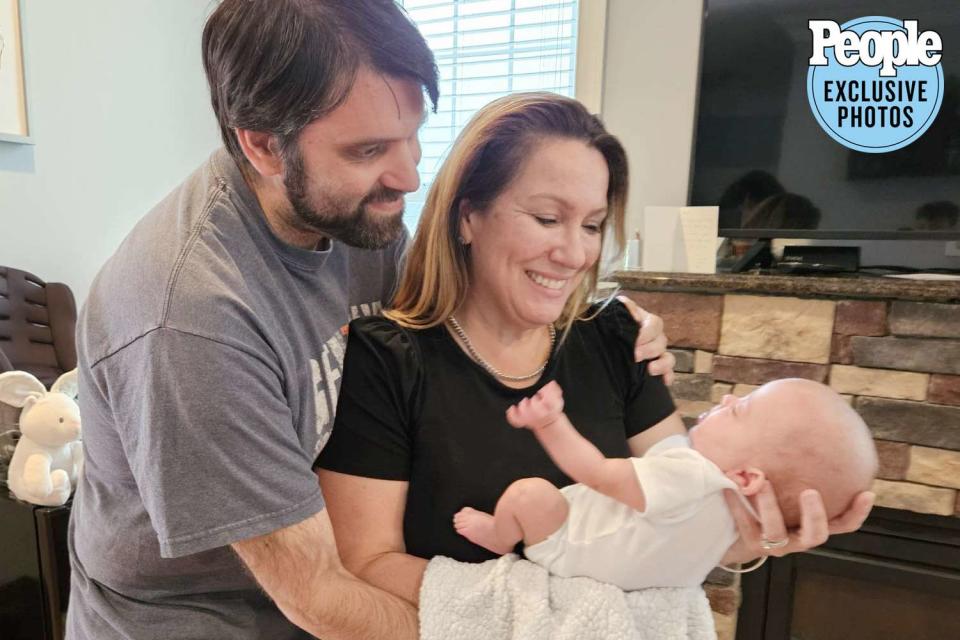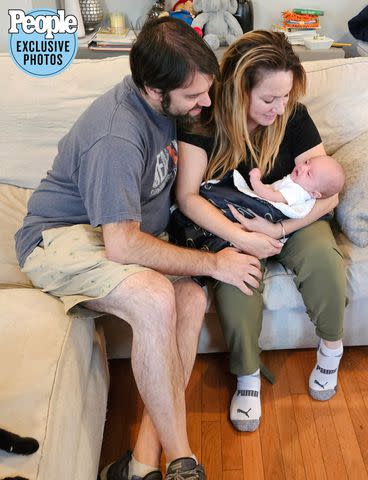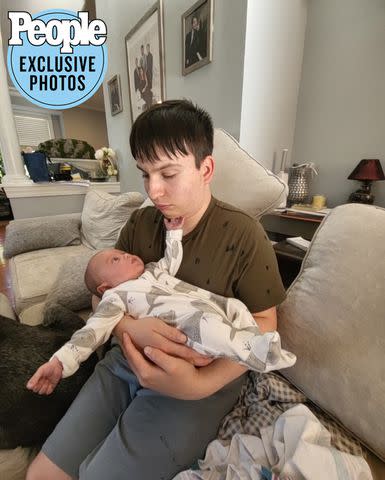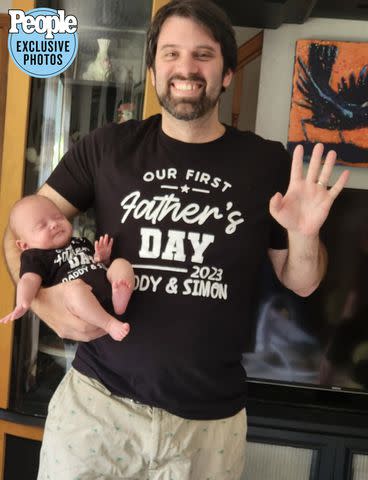N.J. Couple Brings Baby Home After He Was Stuck in Mexico amid Months-Long Surrogacy Drama (Exclusive)
Sam and Laura Kaitz share the first photos of their family at home in New Jersey after bringing baby Simon home from Mexico exclusively with PEOPLE

Kyle Swiney
Sam and Laura Kaitz's family is finally together and complete.
The married couple who experienced legal difficulties bringing home their newborn son, Simon George Kaitz, after welcoming him via a surrogate and surrogacy agency in Mexico has finally settled into their New Jersey home together, sharing the first photos of their reunited blended family with PEOPLE.
"Gosh, I'm just excited about being a family," Laura tells PEOPLE. "I've been there already. My two older sons are adults now, and I really enjoyed being a parent. Sam has been my sons' stepfather since they were 6 and 7 years old. Now, we get to experience it together, from the beginning."
Never miss a story — sign up for PEOPLE's free daily newsletter to stay up-to-date on the best of what PEOPLE has to offer, from juicy celebrity news to compelling human interest stories.

Kyle Swiney
Related: U.S. Couple Uses Surrogate In Mexico to Grow Their Family. Now Baby Is Stuck in the Country
In their search for a cost-effective surrogate, Laura and Sam explored options outside of the U.S. and nearly signed an agreement with a Ukrainian surrogate, another popular option for U.S. couples, days before the Russian invasion of the country. They were recommended to a Mexican agency with the promise that both Laura and Sam, whose sperm was used with a donor egg, could be listed on the baby's birth certificate, as they previously told The Washington Post.
Their baby boy was born on Tuesday, April 18, and met by his dad in Mexico City, where he rented a place to stay, planning on bringing the infant home two days after their June 7 passport appointment at the U.S. Embassy, which was already longer than the couple had hoped for.
"At the very beginning, it felt like we had nothing. It was a real downward spiral," Sam explains. "I had gone to the federal courthouse in Mexico a couple of times because of the case, which the embassy said had to be finished before we'd be able to come home. My lawyers had said, 'Oh yeah, it'll be done June 30th.' Well, June 30th came and then they said July 31st, and at the federal courthouse. They said, oh, no three to six months, at least, it might be over a year."
"That's when Laura started reaching out to reporters. We felt desperate and we couldn't find anyone to help."

Laura Kaitz
"For me, it was a living nightmare. I would be down there in Mexico and missing my kids back home and my younger son, who's on the spectrum, and really needs extra attention, found it difficult to be apart. And when i was home with him, it was really difficult to be without Sam and Simon. Because Kyle didn't fully understand, he felt abandoned, for lack of a better word, by Sam when that wasn't really the case. It was that he was stuck. So Kyle was without a father basically and it was very difficult for all of us."
The family's ability to share their story with The Washington Post caught the attention of Dr. Brian Levine, Founder of Nodal and head of a prominent Manhattan fertility practice, who told his staff at the platform that connects surrogates and intended parents while eliminating the most common pain points for both about their predicament.
Little did they or the Kaitzes know, Dr. Levine was leveraging his contacts within the industry to help the family reunite.
"It felt like nobody was on our side in the situation until he heard from Dr. Levine and his contacts. Others were more concerned with other aspects, but they were concerned with helping us and it gave us hope," Sam shares.
Though the logistics were complicated, Laura says she'll never forget the "tears of happiness" she cried as Dr. Levine explained how he could help.
"To finally have someone who seemed to be in a position to help us, because we felt so lost, it was everything. I reached out to a few attorneys who said we signed paperwork and that was that, but Dr. Levine said, 'No, I think we have a way to help you and we're going to get on it and take care of it.'"
She continues, "We were so blown away, so happy that he reached out, found us and was willing to help. All I know is that before Dr. Levine contacted us, it was going to take at least another month or two. And after they contacted us, through a string of calls and texts, we got the news they could come home the next day."
In a statement to PEOPLE, Dr. Levine shares, "Sam and Laura Kaitz’s situation is a heartbreaking example of why surrogacy needs to be safe, accessible, and affordable for intended parents."
"Growing a family is expensive no matter what avenue parents choose to take. The risk with some surrogacy agencies abroad is that some may give false promises by downplaying costs or by being careless, negligent, or even malicious when it comes to following the proper laws, regulations, and policies surrounding surrogacy," he continues.

Laura Kaitz
"Vetted, domestically based surrogacy agencies and platforms such as Nodal have the transparency, experience, and knowledge to help intended parents and surrogates ensure that they are operating within the law. We also are able to provide parents, surrogates, and babies with genuine emotional and medical support and financial and legal advice throughout the process to avoid legal headaches and emotional heartache.”
Simon, who was born seven weeks premature, has recovered well and is "very healthy" and thriving at home with his family.
"He's about nine and a half pounds now, eating very well. There's no lingering health problems that we can see. He's going to be going to his American pediatrician for the first time in a few days," Laura shares.
"He did see a pediatrician in Mexico City and she was wonderful, she really came through for us. She was very knowledgeable, she took care of him, and she would text us and ask how he's doing. I have to say, the doctors down there were wonderful."
The couple also credits Sam's parents for their help in managing this unthinkable situation.
"His mother went down to Mexico City with him when I wasn't able to when I was at home taking care of Kyle. And then once I was able to come down, she went back home, but when we found out we were going to be stuck there, I had to come back home for Kyle again. So Sam's father went down for a couple of weeks to stay with him and I think without the two of them, it would have been so difficult, especially for Sam. They were instrumental, they were a godsend."
Of advice they could share with others looking into surrogacy, Laura begins with, "Don't go to Mexico."
"Or at least if you do, make sure that any agreement that involves a surrogate is signed by a judge," Sam interjects. "That was a huge road stop for us, that and trying to have the mother's name on the birth certificate, were the start of the nightmare."
"If we could do it all over again, we would not do it internationally. We would stay in the United States. We would have just tried to raise the money because it is twice as expensive to do here as it is in another country," Laura levels. "And if we had a less expensive alternative, that would have been the way to go."
For more People news, make sure to sign up for our newsletter!
Read the original article on People.

